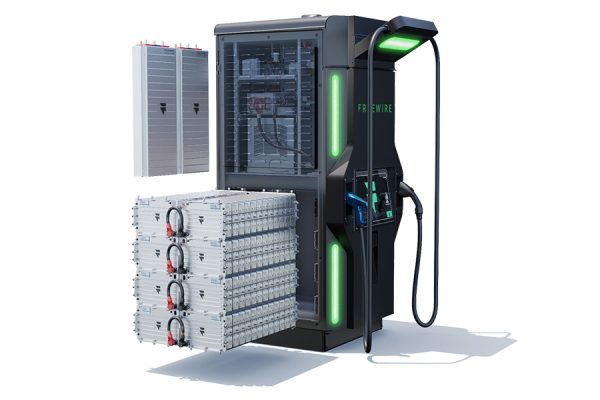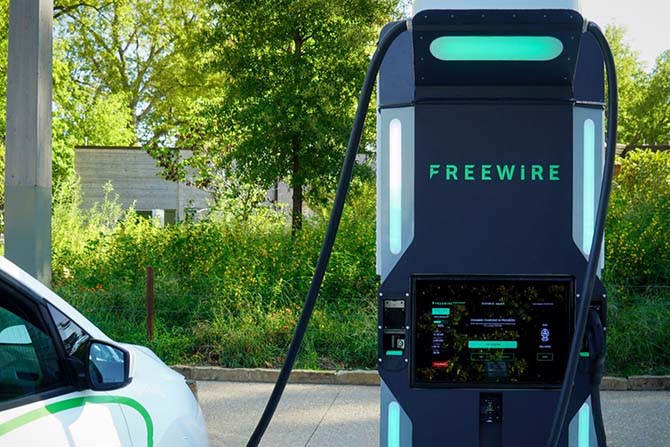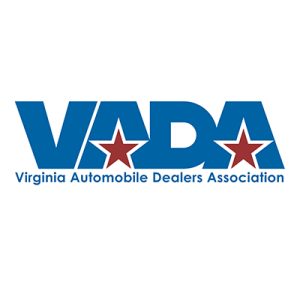Feature Photo: FreeWire’s Boost Charger recharges overnight and supplies power to vehicles during the day, virtually eliminating electricity demand charges. Its energy requirements are nearly 10 times lower than traditional chargers and can power around 20 vehicles daily, adding up to 200 miles of range in 15 minutes.
Partnership Will Bring Ultrafast, Battery-Integrated EV Charging Stations While Minimizing Grid Impact
The Virginia Automobile Dealers Association (VADA) recently announced a partnership with FreeWire Technologies to offer ultrafast, battery-integrated electric vehicle (EV) chargers to franchised new car and truck dealerships across the Commonwealth. FreeWire’s Boost Charger™ 200 is a flexible “Level 3” DC station that uses a battery within its design to lessen the impact on the electrical grid while charging EVs.
One of the biggest hurdles to EV adoption in the U.S. is both the availability of charging stations along with the impact on an already-taxed electrical grid. Typically, auto dealers wanting to upgrade their facilities to supply charging stations must not only purchase a charger but also work with an electrical utility to review power requirements and rates.
FreeWire’s Boost Charger connects seamlessly to existing electrical infrastructure without construction costs, delays, or permitting. It uses an internal 160 kWh battery that recharges overnight and supplies power to vehicles during the day, virtually eliminating electricity demand charges with peak-shaving and load-shifting capabilities. With energy requirements nearly 10 times lower than traditional chargers, the Boost Charger can power around 20 vehicles daily, adding up to 200 miles of range in 15 minutes. Standard EV chargers do not use internal battery storage and use direct power from the grid.
With no requirement for extensive electrical upgrades, Boost Chargers can be installed in hours and also relocated as necessary, offering a simple solution for initial ultrafast charging deployment without large-scale infrastructure investments.
“While dealers are all-in on electric vehicles, the investment required to upgrade their facilities to support them takes time and money, so we need innovative ways to help dealerships make the investment at a moment when Washington is mandating electric vehicles and electrical utilities are working hard to keep up with rising electricity demand,” said Don Hall, President and CEO of the Virginia Automobile Dealers Association. “FreeWire is a smart option for both the short- and long-term for dealers who want to invest in EV without major investments and utility commitments.”
VADA is the first state retail automotive association to partner with FreeWire to deploy its chargers to members. Under the terms of the company’s agreement with VADA, FreeWire will offer a number of products to all association members. The package includes:
- The FreeWire Boost Charger 200, a Level 3, DC ultrafast charging station with an integrated battery for energy storage
- Mandatory three-year, onsite warranty or optional five-year warranty package, including parts, labor and both annual and corrective maintenance through FreeWire’s in-house field service team and FreeWire’s network of authorized service partners
- Access to FreeWire’s Asset Management Platform (AMP™), a software system to manage charger installation, commissioning, and technical support
- Access to EV service partner networks as needed and available, such as Ford’s BlueOval network
- Vinyl-wrapped branding on each charger, as requested by the dealer
To download the Boost Charger product sheet please click the link below.
https://vada.com/wp-content/uploads/2023/08/FreeWire_Boost-Charger-150-and-200_datasheet_2023.pdf
“FreeWire’s Boost Charger is a perfect fit for dealerships because it can be deployed quickly and more easily than traditional solutions,” said Ethan Sprague, Senior Vice President of Sales, Marketing and Policy at FreeWire. “By using existing power available on site, Boost Charger offers the ability to scale according to each dealership’s growing need.”

Tax Credit Information
Qualified purchasers of the Boost Charger may be able to subject up to 25% of applicable deployment costs under the EV Charging tax credit (section 30C, MACRS Asset Class 36.0), which allows for a 30% tax credit on those costs. However, to be eligible for this credit, the EV charging station must be deployed in a low-income, rural or “fuel community” location and only allow up to 30% of applicable costs to be claimed as tax credits.
Unlike other solutions, FreeWire’s battery-integrated technology qualifies for the Standalone Energy Storage Tax Credit (section 48, MACRS Asset Class F). Qualified purchasers may be able to subject up to 74% of applicable deployment costs under this credit, which contains no geographic restrictions and includes domestic content criteria that can increase the allowable tax credit from 30% to even 40% or 50% of eligible costs.
About FreeWire Technologies
FreeWire Technologies was founded in 2014 and is an industry leader in ultrafast EV charging and energy management solutions, solving grid infrastructure constraints and supporting the global transition to electric vehicles. FreeWire’s network of battery-integrated Boost Chargers™ transforms the way energy is distributed and bridges the gap from legacy infrastructure to future technology. FreeWire products are used by Fortune 100 companies, commercial and utility customers, fleets, retail locations, and gas stations across North America and Europe. To learn more, please visit www.freewiretech.com.
Statements regarding eligibility or applicability of tax credits have been prepared for informational purposes only. These statements are not intended to provide, and should not be relied on for, tax, legal or accounting advice.







